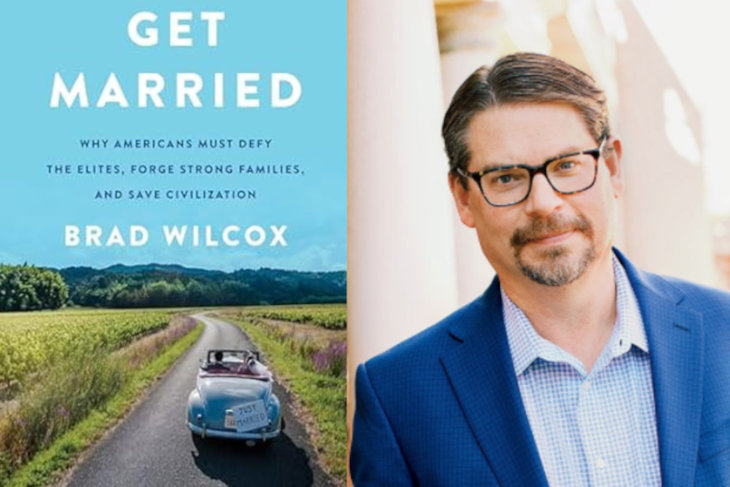 Iran’s Attack on Israel
Iran’s Attack on Israel


8 min read
Research shows that stable marriages offer a proven path to happiness, intimacy and well-being.
As a child, Brad Wilcox was “shocked and unmoored” when his friends’ parents began to divorce—eventually, four out five of his closest pals ended up as “suitcase” kids. Wilcox’s father died when he was three and he was raised by a single mother. As a result, he had gained immeasurably from time spent with these friends and their fathers, going camping, hearing their stories, just talking about current events. “In their own ways, these men had helped to fill the hole in my soul left by my own absent father,” Wilcox writes at the beginning of his new book, Get Married: Why Americans Must Defy the Elites, Forge Strong Families, and Save Civilization.
When Wilcox was born in 1970, divorce was not only losing its stigma but gaining cultural cache. The 1975 bestseller The Courage to Divorce claimed that divorced people would, nearly without exception, “look and feel better than ever before. . . tap sources of strength they never knew they had, enjoy their careers and their children more and explore new vocations and hobbies.”
These messages struck a chord. Marriage and fertility took a nosedive in the 70’s, recovered slightly later on, but are now in freefall, most drastically among the least educated members of American society. Several popular notions work against more robust marriage and childbearing activity. For example, many college-educated young adults focus on financial and professional success as job #1—intimate relationships are secondary, if they are on the horizon at all. Some have bought into the notion that having children isn’t environmentally friendly, but how sustainable is a society with a declining population? Finally, even among marriage-minded young adults, young females are trending more leftward politically, while young men are trending rightward, making it tougher to find compatible life partners.
 Brad Wilcox
Brad Wilcox
As his book title suggests, Wilcox believes that marriage is a crucial bedrock in a healthy society. A professor of sociology and the director of the National Marriage Project at the University of Virginia, Get Married effectively refutes three pervasive myths he has identified that demean and devalue marriage, though he also includes interviews with many men and women who discuss the work and success of their own marriages.
One myth is the “family diversity” canard—the idea that any combination of people living together can constitute a healthy, flexible family. In fact, study after study shows that children thrive optimally when raised by married parents. Those pushing an agenda of “family diversity” also exaggerate the costs of marriage in terms of personal happiness while downplaying the emotional costs of infidelity and family ruptures. Additionally, live-in boyfriends or stepfathers are most likely to abuse children at home—not biological, married fathers.
The second is the “soul mate” myth, which feeds an “all you need is love” fantasy that has encouraged countless people to leave even untroubled marriages in search of the fresh high offered by a new and alluring partner. Such infatuations rarely last.
In the real world, commitment and contentment build marriages and lead to lasting fulfillment.
Finally, the “flying solo” myth projects greater happiness and freedom for people unburdened by the obligations of marriage and children. The media often feed this notion, including articles titled “How to Prioritize Self-Love while You’re in a Relationship,” “The Unselfish Art of Prioritizing Yourself,” and “American Parents are Miserable: Moms and Dads Alike Face a Massive Happiness Gap.” But as Wilcox states, “In the real world, it’s actually commitment and contentment that build marriages and lead to lasting fulfillment. I can’t tell you how many stories I’ve read talking up the desire to ‘self-actualize,’ stop ‘subjugating the self in service of the family’ and to enjoy more ‘hours alone,’ all by authors who ended up divorced.”
Paradoxically, some stress related to parenting may heighten overall happiness and meaning in life, research shows. Too much suffering is obviously bad and leads to despair and unhappiness, but too little suffering, too much living for self-pleasure, can lead to a sense of meaninglessness and unhappiness as well.
While society today urges young adults to prioritize education and building a career as the most important keys to fulfillment, no degree, job title, nor any other type of “expressive individualism” mentioned above leads to lasting happiness for most people. “It’s when we live for others that our lives are happier,” he told Aish.com. “We have so much research proving that stably married people are generally healthier, happier, have more sex, and even accrue more wealth than unmarried people. Unfortunately, if people don’t make space for love and marriage, they often end up in their 30’s or later alone and filled with regrets.
Closing our hearts to marriage hurts society in general but has been particularly pernicious for the most economically and socially vulnerable, where marriage rates have plummeted and fewer than half of children live with married parents. This is the demographic where “deaths of despair,” particularly among aimless men, are rife.
Fortunately, Wilcox points to good news on the marriage horizon. In the book, he identifies four groups that are building strong, successful families:
Strivers—secular and highly educated individuals who have “course corrected from the 70’s spirit of individualism and easy come, easy go marriages” of their parents’ generation. One left-leaning writer said, “My brother and I decided, along with many other grown children of the runaway moms, that we would put our families first and ourselves second.” The risk of divorce among college educated couples has dropped by 25 percent since the 70s.
Wilcox notes the irony that many cultural elites from this affluent, educated demographic “preach left while living right,” trashing traditional marriage in public while living traditional and stable married lives with children in private. For example, those in the top 20 percent of income totally align with traditional gender roles—not many stay-at-home-dads to see here. And surveys show that both elite and ordinary women typically prefer men they view as strong and masculine, ambitious, and whom they view as ‘good providers’ and ‘protective.’
The Faithful—religious Jews, Christians, Catholics, and Moslems. “Religious families tend to erect fences around their marriages, careful not to socialize individually with members of the opposite sex, not tracking or establishing connections with former boyfriends or girlfriends, understanding the risks of porn, and having faith communities with whom to share good times and offer support in hard times,” Wilcox writes.
Asian Americans--for whom family solidity and marriage remain sacrosanct.
Conservatives--political and cultural.
“These groups are building stable and largely satisfying marriages and reject the myths that distort our thinking about love, marriage and family life,” the author writes.
Get Married is a compelling read, filled with quotes from both married and unmarried individuals, sharing their perspectives, including struggles, regrets, and satisfactions. The book is filled with compelling evidence proving the physical, emotional, societal, and financial benefits of marriage for both marriage partners and their children. He acknowledges that not everyone can or should get married, and couples should part ways in cases of drug abuse, domestic violence, and patterns of infidelity.
Wilcox also offers his recipe of five “C” pillars of stable and happy unions, all of which align with Jewish values:
Communion—the “we before me” attitude. “This attitude removes marriage from the sort of individualistic, tit-for-tat exchange approach that is running so many marriages into the ground today,” he writes.
Children—prioritizing their well-being as the primary goal and focus of a couple. Children raised by married parents are much more likely to thrive academically, socially, and emotionally. Conversely, their odds of struggling, including with depression, delinquency, and dropping out of high school, rise significantly if their parents do not get or stay married.
Commitment--keeping divorce off the table except in cases of drug abuse, physical abuse, or persistent infidelity. Couples who embrace classic fidelity norms are about five times more likely to be very happy in their marriages than those who don’t affirm this value: “The message is, ‘I will always be here for you. You can count on me, my love will not be hijacked.’”
Cash—acquiring shared assets together, but not keeping separate checking accounts.
Community—surrounding yourselves with like-minded people. This is especially easy to do in faith communities.
Wilcox is pleased to see an uptick in family stability today, reflecting not only class but culture: religion, ethnicity, and even ideology. He feels the culture has moved beyond the “peak woke” attitude and sees more college students now than ten years ago who seem interested in marriage and family. While they are “more self-consciously intentional about dating and their personal futures, they remain a minority of students.”

First off, it is always good to see Judy Gruen! 😀. Second, I am so sorry that Brad Wilcox lost his father when both were so young. Finally, like every other major decision in life marriage and divorce should never be undertaken casually. Sadly there are couples who stay together “for the children” when divorce would have been a much wiser move.
In Genesis - G-D said it was not good - for a man to be alone - & He Created Eve - for Adam - & paired them in a marriage - as MALE & FEMALE. That also created a stronger spiritual bond for both. Albeit after their sin. G-D also intimated that - the husband - had the responsibility - to head the family bond - with G-D's instruction to the woman - that - your craving will be for your husband - & he will rule (have the responsibility) over you. Also the bonding in mans world - can be equated to - double bonding to strengthen an object. The bonding then can become and help support - our connection to G-D's Written Torah Commandments and Laws.
Disagree with 'not keeping separate checking accounts'; Wife and I share common expenses, and have individual checking accounts for our own personal use.
Marriage makes the two parts involved stronger in every way.Thank you for your excellent review of Wilcox´s book!
Great!
In young middle age in the 70's I happened to throw into a staff room conversation that livinig without being married was a bit like driving down the motorway /freewaay of life without an insurance certificate. My younger colleague who taught religion was in on this chat and chortled - which was as far as being English allowed for in public in thse times.